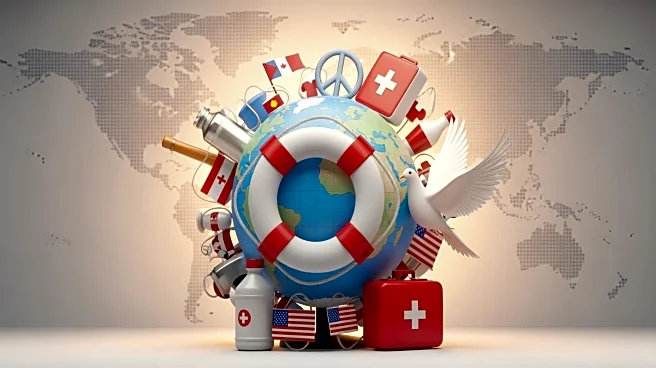What's Happening?
The United Nations Office for the Coordination of Humanitarian Affairs (OCHA) has announced a global humanitarian appeal for 2025, seeking US$44.7 billion to provide life-saving aid to 190 million people
across 32 countries and nine refugee-hosting regions. This appeal is a response to the projected need for assistance by at least 305 million people worldwide. The initiative involves more than 1,500 humanitarian partners who are working together in prioritized response plans to deliver critical support. The appeal underscores the urgent need for coordinated efforts to address humanitarian emergencies and protect civilians in crisis situations.
Why It's Important?
The 2025 humanitarian appeal is significant as it highlights the growing need for international cooperation in addressing global crises. With over 300 million people requiring assistance, the appeal aims to mobilize resources and partners to provide essential aid such as food, shelter, healthcare, and protection. This effort is crucial for mitigating the impact of conflicts, natural disasters, and other emergencies on vulnerable populations. The appeal also emphasizes the importance of respecting international humanitarian law and protecting civilians, which are fundamental principles guiding humanitarian missions.
What's Next?
The success of the 2025 humanitarian appeal will depend on the ability of OCHA and its partners to secure the necessary funding and implement effective response plans. As the appeal progresses, stakeholders including governments, NGOs, and private donors will play a critical role in supporting these efforts. The focus will be on ensuring that aid reaches those most in need and that humanitarian operations are conducted efficiently and ethically. Continued advocacy and policy development will be essential to address challenges such as the politicization of aid and competition for funding.
Beyond the Headlines
The appeal reflects broader ethical and legal dimensions of humanitarian work, including the need for impartiality and neutrality in aid delivery. It also highlights the long-term shifts in global humanitarian needs, driven by factors such as climate change, geopolitical tensions, and economic instability. As humanitarian missions evolve, there is a growing emphasis on sustainable solutions and resilience-building to reduce dependency on aid and empower affected communities.









